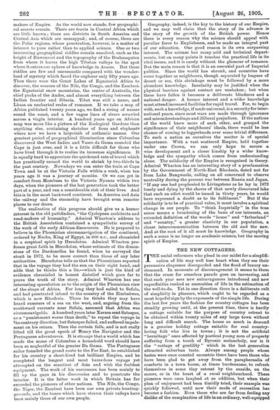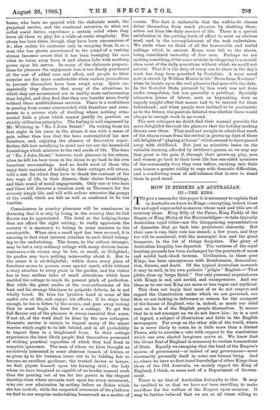T HE social reformers who plead in our midst for a
simplifi- cation of life may well lose heart when they see their persuasive eloquence disregarded and the flood of luxury un- stemmed. In moments of discouragement it seems to them that the craze for senseless parade goes on increasing, and that each year sees new extravagances introduced and new superfluities ranked as necessities of life in the estimation of the well-to-do. Yet in one direction there is a deliberate cult of simplicity in pleasure, which ought to be regarded as a most hopeful sign by the exponents of the simple life. During the last few years the fashion for country cottages has been steadily growing until, at the present time, there is hardly a cottage suitable for the purpose of country retreat to be obtained within twenty miles of any large town without long and difficult search. The house so ranch in demand is a genuine holiday cottage suitable for real country- loving folk who live in towns ; it is not the artificial "hermitage" once affected by poetical young men of property suffering from a touch of Byronic melancholy, nor is it the "cottage of gentility" which in the last generation attracted suburban taste. Always among people whose tastes were once counted eccentric there have been those who have been glad to get away from the paraphernalia of comforts in a town house, at times burdensome, to refresh themselves in some tiny retreat by the seaside, on the moors, or in the heart of a rural neighbourhood. These pioneers were once laughed at as oddities, but when their plan of enjoyment had been timidly tried, their example was quickly followed, until now their mode of recreation has become a fashion. Even those who are far from feeling any dislike of the complexities of life in an ordinary, well-equipped house, who have no quarrel with the elaborate meals, the perpetual service, and the continual attention to what are called social duties, experience a certain relief when they leave all these to play for a while at rustic simplicity. The strain has been there, though they have been unconscious of it ; they realise its existence only in escaping from it, as a man who has grown accustomed to the sound of a rushing stream becomes aware that it has been besieging his ears when he turns away from it and silence falls with soothing power upon his nerves. In many of the elaborate prepara- tions for pleasure the enjoyment won is too dearly purchased at the cost of added care and effort, and people to their surprise are far more comfortable when various precautions to prevent discomfort have been swept away. Quite un- expectedly they discover that many of the attentions to which they are accustomed are in reality more embarrassing than helpful, and they find that they can breathe more freely without. these multitudinous services. There is a restfulness in passing from rooms overcrowded with furniture and orna- ments to a severer style of dwelling where nothing orna- mental finds a place which cannot justify its position on strictly utilitarian principles. The feeling is well expressed by Mr. Whiteing in "No. 5 John Street." On waking from his first night in his room. in the slums, it was with a sense of gain rather than loss that the hero contemplated his new furniture, and, enjoying the absence of decorative super- fluities, felt how satisfying to mind and eye are the household furnishings which minister to the real needs of life. The hero of "No. 5 John Street," however, took pleasure in his return, when he left his bare room in the slums to go back to his own luxurious surroundings. And no doubt most of those who enjoy their snatches of holiday in their cottages will return, with a zest for which they have to thank the contrast of the two ways of life, to their dinners, their choice furnishings, and their round of social engagements. Only one or two here and there will discover a vocation such as Thoreau's for the severely simple life, and will with ardour renounce the pomps of the world, which are felt as well as confessed to be but vanities.
Connoisseurs in country pleasures will be unanimous in declaring that it is only by living in the country that its full flavour can be appreciated. The hotel or the lodging-house does not afford the right setting ; to really appreciate the country it is necessary to belong in some measure to the countryside. When once a small spot has been secured, it is amazing to find what interest attaches to each detail belong- ing to the undertaking. The house, to the callous stranger, may be but a very ordinary cottage with many obvious incon- veniences,—its rooms may be low, or small, or ill-lighted ; its garden may have nothing noteworthy about it. But to the owner it is all-delightful ; within doors every piece of furniture seems to possess some special merit, while without a story attaches to every plant in the garden, and the visitor has to hear endless tales of small alterations which have enabled the cottage to reach its present pitch of perfection. But while the guest smiles at the over-enthusiasm of his host and his strange blindness to palpable defects, he is not wholly bored. He tries his 'prentice hand at some of the useful arts of life, and enjoys his efforts; if he stays long enough, he too is bitten by the mania, and goes away vowing that he must begin the hunt for a cottage. To get the full flavour out of the pleasure it seems essential that some, if not all, of the work shall be done by the new cottagers. Domestic service is certain to import many of the minor worries which ought to be left behind, and in all probability to import them in a heightened form. In their cottage experiences the least likely people find themselves possessed of striking practical capacities of which they had lived in complete ignorance. The man of whom we have thought as exclusively interested in some abstruse branch of letters, or as given up to his business, turns out to be bidding fair to become an excellent gardener; the trusted doctor or lawyer, we find, piques himself upon his farming skill ; the lady whom we have imagined as capable of no harder manual work than the pouring out of tea for her guests in the elegant drawing-room where servants wait upon her every movement, wins our new admiration by setting before us dishes which she has cooked; while the respected ornament of the platform we find to our surprise undertaking housework as a matter of course. The fact is undeniable that the well-to-do classes debar themselves from much pleasure by shutting them- selves out from the daily services of life. There is a special satisfaction in the putting forth of effort to meet an obvious need, and in the accomplishment of the task undertaken. We smile when we think of all the honourable and useful callings which in ancient Rome were left to the slaves, being considered unworthy of free men. Perhaps we are making something of the same mistake in relegating to a menial class most of the daily avocations without which we could not subsist. That it is the duty of every one to share in the day's work has long been preached by Socialists. A more novel note is struck by William Morris in his "News from Nowhere" when he insists upon the real pleasure that goes with the duty. In the Socialist State pictured by him work was not done under compulsion, but was generally a privilege. Specially attractive pieces of labour, such as haymaking, were so eagerly sought after that names had to be entered for them beforehand; and when people were inclined to be pessimistic as to the future, the question debated was whether there would always be enough work to go round.
The new cottagers no doubt find their manual pursuits the more delightful through the glamour that the holiday-making throws over them. They need not scruple to admit that much of the charm comes from the revival in grown-up days of those old delights of "playing at house" which seemed to have passed away with childhood. But just as scientists insist on the valuable training afforded by children's games, so we may say that great is the gain if, through their grown-up play, men and women go back to their town life less one-sided members of the community than they were before, carrying into their own homes a greater ability to cope with domestic difficulties, and a comforting sense of self-reliance that is sure to stand them in good stead.



































 Previous page
Previous page